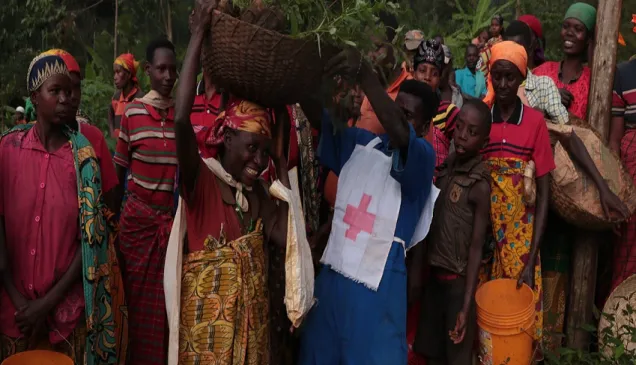African Union, ICRC Roundtable Seeks Innovative Tech Solutions for Landmine Clearance in Africa

The African Union Commission (AUC), in partnership with the International Committee of the Red Cross (ICRC), hosted a roundtable discussion on the ongoing challenges posed by landmines and Explosive Remnants of War (ERW) in Africa as part of the Commemoration of the International Day for Mine Awareness and Assistance in Mine Action. The event highlighted the devastating impact these weapons have on communities and explored innovative solutions for faster and more cost-effective demining.
The roundtable brought together representatives from 8 high-risk African Member States alongside countries with successful demining programs. Operational demining actors such as UNMAS also participated. In addition, humanitarian organizations, the academia, selected donor states and private sector representatives.
During the opening remark, ICRC Delegation to the African Union, Head of Delegation, Bruce Mokaya noted the importance of the event at this critical time for African Member States ahead of the 5th Review Conference to be held in Cambodia in November 2024 to allow exchange on the progress, best practices, challenges, and the way forward on the implementation of the Anti-Personnel Man Ban Convention. Concerning the needs of victims and affected communities. he added, "We believe it is essential to place victims and affected communities at the center of our action to reduce their suffering. Victim assistance is a long-term commitment that requires sustained mobilization of resources and political will from States."
The African Union Commission (AUC), representative Jocelyn shed light on several critical issues, Jocelyn acknowledged the landmine contamination faced by attending Member States (MS) and the challenges they encounter in fulfilling clearance obligations. The importance of this meeting was emphasized to address these shared challenges. Shifting focus to the upcoming 5th Review Conference of the Anti-Personnel Mine Ban Convention, Jocelyn raised key issues discussed in Ghana. These included the need for State Parties to fulfill reporting obligations, the development of updated strategies to address the threats at national, regional, and continental levels (promoting South-South cooperation).
Despite progress made towards eradicating landmines, several countries highlighted the increased use of improvised explosive devices (IEDs) in conflicts, posing a significant threat to civilians and demining efforts. Algeria, which has cleared vast swathes of its own territory contaminated by landmines emphasized the importance of South-South cooperation in addressing the challenge. A key focus of the roundtable was exploring innovative solutions for demining. The ICRC presented a project in collaboration with Waseda University in Japan that utilizes drone technology and machine learning to detect landmines and ERW. This technology has the potential to revolutionize demining efforts by expediting the process and reducing risks.
Several African nations expressed keen interest in piloting this new technology. Discussions also centered on knowledge transfer and capacity building, with emphasis on training local demining personnel on using the latest tools and techniques. ICRC Japan Head of Delegation, Shoko Hanzawa, , reiterated to undertake field test in Africa to detect mines and announced the availability of an expert to conduct the testing and expressed readiness for further discussion with the interested AU Member States.
The roundtable underscored the need for sustained financial resources to support demining activities across Africa. The EU reaffirmed its commitment as a leading donor and called for a more coordinated approach to maximize impact. Similarly, Germany recalled its €17 million budget to assist African states with de-mining.
Discussions also highlighted the importance of advocacy efforts to raise awareness about the dangers of landmines and ERW, promote adherence to relevant international conventions, and address the root causes of conflicts that perpetuate these threats. The roundtable called for continued dialogue with State and Non-State actors to minimize civilian casualties.
The roundtable concluded with a renewed commitment from Member States and partner organizations to collaborate on achieving a mine-free Africa and push for a universal adherence to the Anti-Personnel Mine Ban Convention (APMBC). The AUC pledged to follow up on key issues raised during the discussions, including exploring the use of new technologies, facilitating knowledge transfer, and securing additional resources for demining programs. Several countries, like Algeria and Azerbaijan, offered to share expertise and equipment in a spirit of South-South cooperation.



